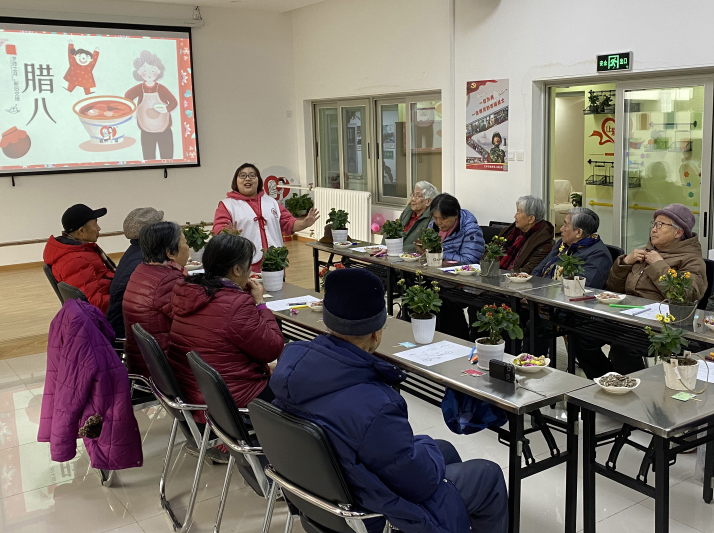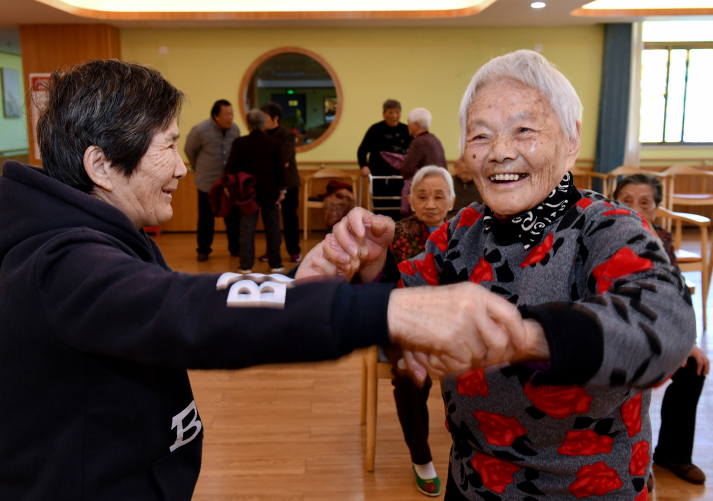| China |
| Homely Care | |
| Nursing homes without fences offer a solution to aging problems | |
|
|
 Residents and the staff of a senior service station in Sanlihe in Beijing enjoy festivities on January 2 (LIANG XIAO)
The core spirit of Spring Festival has always been going back home for the grand family reunion. However, the Zhuang family in Beijing is considering celebrating the festival in a nursing home.
Zhuang Jianping, 66, is unable to look after his mother who has Alzheimer's disease. She stays at the Huafang Care Center, a nursing home for the elderly in the capital. In 2019, the mother, in her 90s, went to her daughter's apartment to celebrate the Lunar New Year but fell and broke her hip bone. She was rushed to hospital and the whole family spent the festival season there. This year as the festival approaches, Zhuang is wondering what to do. "Maybe this Spring Festival my sister and I will stay with mother in the nursing home. We do not want to risk her getting hurt again," he said. Life in nursing home As China's society ages, there are many similar cases. Du Qiaoling, Manager of the Huafang Care Center, told Beijing Review that 60 octogenarians currently live in the community-based nursing home, mainly local residents with physical or mental disabilities. Since their relatives lack professional nursing skills, most of them will remain in the home during Spring Festival. A small number who are in relatively good health will go home for the reunion dinner and stay there for a day or two before coming back. "I am very relaxed here and satisfied, I don't want to go back to my own place," 90-year-old Qian Jinzi said with a smile. Although her apartment is nearby, she prefers to stay with her friends in the nursing home. Though there is still some time before Spring Festival dawns, festive red lanterns have been hung in the nursing home and teams of volunteers have begun to visit to entertain the residents. The volunteers themselves are between 55 and 70 years old. Li Jinfeng, a 57-year-old local who has organized a group that recites poetry and reads out to the residents at care homes, has been doing this voluntary work for several years. Senior people living in nursing homes also hope to be part of the festive atmosphere, Li said. Besides the performances, she and other volunteers will spend some time during Spring Festival holiday in nursing homes in nearby communities, making dumplings with the residents and having lunch together. "I will grow old soon, so I am always thinking of doing something for seniors," Li said. According to official statistics, by December 31, 2018, Yuetan, the 4.13-square-km sub-district where Huafang Care Center is located, had over 38,000 permanent residents aged over 60, nearly one third of the population of the sub-district. Among them, nearly 9,500 were over 80. Yuetan is one of the areas with a prominent aging problem. In traditional Chinese society, taking good care of one's elderly parents is the duty of the children. In the view of a large part of Chinese elderly, living in a nursing home is still the last option. As long as they can take care of themselves, or have spouses or children to look after them, or have the financial capacity to hire help, they are generally not willing to live in nursing homes. Also, China's senior care industry is still in its infancy, unable to fully meet the needs of the growing elderly population. Home-based care is still the first choice for the elderly in China.  (left) Residents and the staff of a senior service station in Sanlihe in Beijing enjoy festivities on January 2 Xu Gendi (right), 80, and her 72-year-old roommate dance together at an elderly care center in Jian'ou, Fujian Province in southeast China, on November 14, 2019 (XINHUA)
A new care model Against this background, Yuetan took the initiative of establishing "fenceless nursing homes" in 2004. The concept is that professional nursing services can be extended outside nursing homes to cover the elderly who live in their own homes. Mo Hailan from the Yuetan Sub-District Office said Yuetan has set up a service platform comprising three full-time community-based care centers and six day-care senior service stations. These facilities are operated by professional companies while the premises are provided by the local government without charge but with supervision to ensure the services are affordable and up to standard. Senior citizens from surrounding communities can dine, have a shower and conduct cultural activities at these nursing homes and senior service stations. It costs around 25 yuan ($3.6) per person for a six-dish buffet and around 150 yuan ($21.7) for day care. During Spring Festival, the elderly who live at their own home may encounter problems, like their carers returning home or traveling. To tide them over, the fenceless nursing homes will provide them services during the festival, such as food delivery. From the sub-district, the fenceless nursing home project is now being rolled out across Beijing. By November 28, 2019, the capital had built 30 community-based care centers and 160 senior service stations; 91 more service stations will be completed in 2020. To facilitate elderly care, in October 2019, measures to administer and implement subsidies and allowances for elderly care services in Beijing were formally implemented. Seniors with financial difficulties, or with disabilities, or aged over 80 are eligible for the subsidies ranging from 100-800 yuan ($14-116) per month, which is to be paid for nursing services. The elderly in community-based nursing homes still live in familiar neighborhoods and their families can visit them frequently. Those who choose to live in their own homes can avail of professional services from the fenceless nursing homes. However, the development of such nursing homes faces some bottlenecks. Mo said the beds in the care centers are not enough while senior service stations are yet to be fully utilized. "We still need to make efforts to let people know about the service stations," she said. Copyedited by Sudeshna Sarkar Comments to wanghairong@bjreview.com |
|
||||||||||||||||||||||||||||
|
